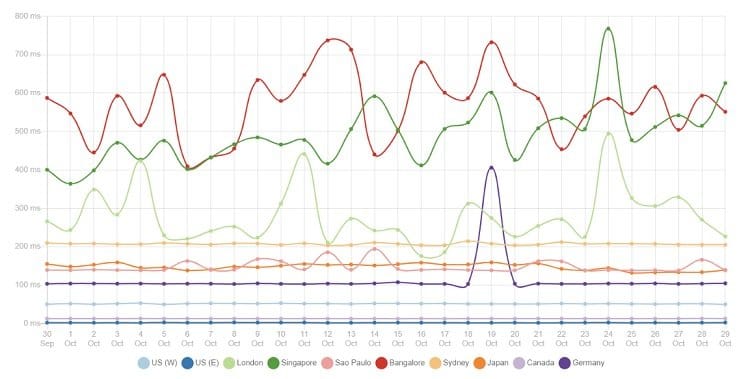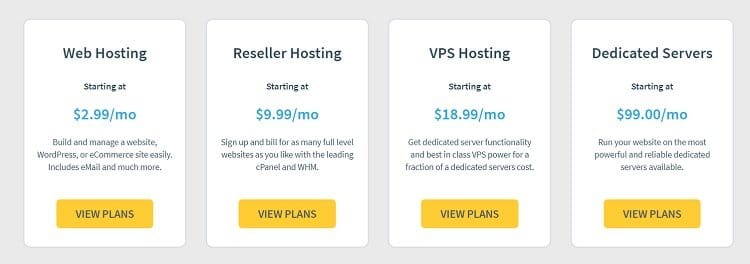Your web host is the foundation of your website. There is nothing worse than for a visitor to click on your website only to find an error screen showing – “This site can’t be reached”. If you are doing online business, this is definitely not something you wish to see.
If you’re considering moving your website to a new web host, you’ve come to a great place to start researching the process: This article goes over five important things that you should know about the process of changing hosts.
5 Things To Know When Switching Web Hosts
1. Security Is Key
Security is a vital consideration when choosing a new web host. A study shows that cybercrime will cost the world $6 trillion annually by 2021, and it’s important to put security as the first priority in this topic. Some of the security features you should look for include:
- Backup features. These allow you to recover your website if something goes wrong, letting you get your website back up and running much more quickly.
- Secure sockets layer (SSL) certificate availability. To give your website the best security possible, it’s necessary to install an SSL certificate, which protects data as it travels across the internet. As an added bonus, website visitors will likely feel better about using your website if they see that it has SSL protection. (You can understand the basics about SSL certificates here.)
- Encrypted connections. The basic FTP file transfer is very vulnerable. Imagine your information was intercepted midway when you were logging into your server? Your username and password can be hijacked. SFTP would be the better choice if you want to bring down the risks during data exchanges.
- Malware protection. There are more than 18.5 million websites infected with malware at any time. So, make sure your new host offers protection against malware. For instance, WebHostPro offers SiteLock website security for customers to protect their websites.
While it’s important to have security features included in the web host, not to forget, continual patching to keep your website up-to-date is necessary as well.
Websites are constantly under attack, and a security breach can derail your web presence and erode visitors’ trust. Good security is worth investing in, so keep it in mind when switching hosts.
2. Hosts Differ in Reliability and Performance
As we have known, different hosts offer different levels of reliability. Choosing a reliable host is vital because it affects everything from the experience visitors have while interacting with your website to whether or not they even find it in the first place: More reliable websites tend to do better on search engine results.
Several factors can affect how reliable a host will be for your particular website. For instance, resources such as
- Memory
- Storage space
- Processing power
- Bandwidth
- Inode usage
vary from host to host and plan to plan. It recommends finding out whether a potential host uses a mechanical drive or a solid-state drive (SSD), with the latter being faster and preferable.

Another factor is the location of the host data centers. Generally speaking, you’ll want access to a data center that is closer to your target market. This will give the people you are hoping to reach a better user experience while visiting your website. That’s because the closer the data center is to your website’s visitors, the more quickly the website will load.

Perhaps the most important metric related to a host is consistency. Taken in the context of uptime and server response speed, consistency is vital to know how stable the performance of a host will be over longer periods. Hosting uptime is usually expressed as a percentage, while response speed is measured in milliseconds. The result will be how stable your website is to your targeted audience.
3. Hosting Services Come in Different Categories
- Shared hosting—in which a server supports multiple websites—is typically the cheapest option. It can be appealing to younger businesses without much web traffic.
- Dedicated hosting features a single server supporting a single website. It is a step-up in both performance and price from shared hosting.
- Cloud hosting, or virtual private servers, is somewhat similar to shared hosting servers. However, they are more flexible, and they can be ideal for businesses with fluctuating needs. (Find out more about the differences between shared hosting and VPS hosting.)
- WordPress servers make use of the three aforementioned setups to run WordPress-based websites. These are ideal for content creators, according to Kaelin.
Being aware of these categories can help you know what to look for when switching web hosts, whether you’re looking to improve the performance of your website or replicate some of the features of your old host.

For instance, if your website needs to perform at an extremely high level, then you might want to go for a dedicated server provided by your new host.
4. Support Varies
David Gewirtz, writing for CNET, points out that you should think about how much ongoing support you will need from your web host. For instance, if your current host provides lots of support—and you find that helpful—then you’ll want to make sure the new host you’re moving to provides a similar level of support. And if you’re changing hosts because you’re dissatisfied with the support you’re receiving from your current host, make sure the new package offers the level of help you’re looking for.
Gewirtz also points out that on the extreme end of this, managed service is an option that will take site management off your plate completely. However, if you’re looking for a more hands-off approach from your host, then you may be able to save some money by buying a plan that doesn’t feature support as heavily.
Regardless of the level of support, you’re looking for, you can test out many support features before committing to a new web host. For instance, one method for getting a feel for a web host’s level of support is interacting with the live chat feature.
5. Review Sites are Very Helpful
Reading this article has hopefully been a helpful starting point for you, but it’s important to do additional homework before committing to a new host.
You can continue your research by visiting review websites such as Hosting Advice, Trustpilot, and HostScore. These are especially helpful when you’re narrowing down your options because reviews from these websites can help you evaluate the strengths and weaknesses of specific web hosts. Also, you get to know the real user feedback and the editor’s opinion about a web host.

